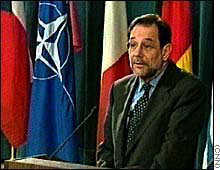|
Arab
League, EU Warn Sunni Boycott Spoils Poll
 |
|
“The boycott will affect the credibility of the outcome,” said Zaki. (IOL)
|
CAIRO,
January 26 (IslamOnline.net & News Agencies) – As the
controversial Iraqi elections are only three days away, the Arab
League and the European Union have warned in unison of the grave
consequences of a Sunni boycott of the January 30 polls.
“The
boycott will affect the credibility of the outcome and if the outcome
is to be a national assembly that is to draft a constitution, there
will be a major problem,” Arab League spokesman Hossam Zaki told
Reuters Tuesday, January 25.
Members
of the 275-seat National Assembly will be elected to choose a
Presidency Council later and draft the country’s constitution, with
Shiites expected to dominate the poll.
The
constitution must then be ratified through a national referendum –-
scheduled to take place at the end of 2005.
“You
end up having an electoral process that is secretive because of the
security situation and which is not comprehensive because of a boycott
by a significant component of Iraqi society,” Zaki added.
Some
major Sunni groups, including the Association of Muslim Scholars and
the Islamic Party, are boycotting the election and have said it should
be delayed as long as it will be held under an occupying power and in
view of the prevailing insecurity.
The
pan-Arab body has earlier called for the US-backed interim government
to hold a conference to promote reconciliation with its opponents to
ensure election participation.
Zaki
said Baghdad had taken only “shy and very small moves” towards
reconciliation.
“None
of the big actors, the significant actors, in Iraq responded
positively to this,” he said.
“Catastrophe”
EU
foreign policy chief Javier Solana, meanwhile, has warned that it
would be a “catastrophe” if Sunnis do not vote in this month's
landmark elections in Iraq.
“I
don't think that Iraq (could be) stable if the Sunnis do not
participate in the political process,” Solana told the foreign
affairs committee of the European Parliament.
 |
|
“If there were no Sunni representative, it would be a catastrophe,” said Solana. (CNN)
|
“If
there were no Sunni representative, it would be a catastrophe,”
Agence France-Presse (AFP) quoted Solana as saying Monday.
Solana
said at least the Sunnis should take part in drafting the new
constitution and the new electoral process if they remained reluctant.
“Otherwise,
I don't think we will have a stable Iraq if the Sunnis are not part of
the process. Every sensitivity in Iraq has to participate in the
electoral process,” he reiterated.
Voters
will not be choosing individual politicians, but a list of candidates
representing a party or coalition.
The
vote is based on a single constituency, proportional closed-list
system, meaning that if a party gets 10 per cent of the votes, it gets
10 per cent of the seats.
The
parties choose the order of candidates on their lists, which is then
final. If a party wins 10 seats, their top 10 people are elected.
Lay
people, nevertheless, are left
in the dark as they have not got the faintest idea
about the blueprints of the candidates or even the names of the
runners.
Even
the 1.2 million Iraqis abroad showed scant
interest in the process, with less than 10% registering
to cast their ballots in the 14 countries designated by the electoral
committee and the International Organization for Migration.
The
White House acknowledged January 13 the controversial election would
be
flawed
because of raging insecurity in the war-torn country as more Iraqi
parties boycotted the polls.
|